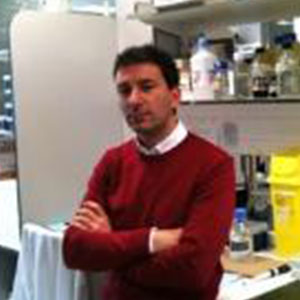Professor Michele Bombardieri

Clinical Senior Lecturer in Rheumatology
Centre: Experimental Medicine and Rheumatology
Email: m.bombardieri@qmul.ac.ukTelephone: +44(0) 20 7882 5890
Profile
Michele Bombardieri is Professor of Immuno-Rheumatology (HCC) at the Centre for Experimental Medicine and Rheumatology. Professor Bombardieri graduated at Catholic University of Rome and completed his specialist Rheumatology training with Prof Valesini at University of Rome “La Sapienza”. Since 2003 he joined Prof Pitzalis’ group at Kings College London where he completed his PhD in Experimental Rheumatology in 2007 with support from a Clinical Research Fellowship from the Arthritis Research Campaign (now Arthritis Research UK). In 2007 he relocated to the William Harvey Research Institute at Queen Mary University of London as part of the Centre for Experimental Medicine and Rheumatology. He held an ARUK Clinician Scientist Fellowship until 2010 when he was awarded an NIHR “new blood” senior clinical lectureship.
Research
Group members
Post-Doctoral Fellows: Dr Elisa Astorri, Dr Emanuela Carlotti, Dr Elisa Corsiero, Dr Cristina Croia, Dr Nikola Lepse, Dr Davide Lucchesi, Dr William Murray-Brown, Dr Vidalba Rocher-Ros
PhD Students: Dr Sophia Grigoriadou, Dr Alessandra Nerviani, Ms Elena Pontarini
Visiting Research Fellows: Mr Edoardo Prediletto
Summary
Professor Bombardieri leads the Immuno-Rheumatology Research group at EMR (10 researchers) and the Sjogren’s Clinical Research Team (1 clinical trial coordinator, 1 specialist nurse, 2 clinical research fellows). His major research interests focus on the elucidation of the cellular and molecular mechanisms regulating autoreactive B cell activation, breach of self-tolerance and perpetuation of autoimmunity in Sjogren’s syndrome and rheumatoid arthritis. In addition, he has significant interest in translational research with the aim to identify new therapeutic targets and novel biomarkers in order to develop early phase clinical trials based on patients’ stratification and target validation in Sjogren’s syndrome and inflammatory arthritis. Furthermore, Dr Bombardieri is currently investigating the cellular and molecular mechanisms involved in the response/relapse/resistance to B cell depleting agents in rheumatic diseases.
Professor Bombardieri seats on the International Scientific Committee for the International Symposia in Sjogren’s syndrome and the Medical Council of the British Sjogren’s Syndrome Association (BSSA). He serves as a regular reviewer for UK and International Research Funding Bodies and several International Scientific Journals including top speciality Journals such as Arthritis and Rheumatology, Annals of the Rheumatic Diseases and the Journal of Immunology. He has authored over 60 peer-reviewed publications in International Journals in the field of autoimmunity, Sjogren’s syndrome and inflammatory arthritis and attracted £2.4million in research income since he joined QMUL.
Evolution of TLS in response to viral infection in the SGs and development of autoimmunity
(A) Viral infection of the SG mucosa induces activation of epithelial and stromal cells and resident macrophages, triggering the production of inflammatory chemokines and the expression of adhesion molecules on blood vessels, leading to the recruitment of innate immune cells from the peripheral compartment to the SGs. Inflammatory chemokines attract inflammatory monocytes and within the first week from infection, T cells leading to the secretion of inflammatory cytokines (e.g., IFN-γ, TNF-α, IL-1β) that in turn, activate resident NK cells and drive macrophage polarization and a Th1-mediated antiviral response.
(B) Despite potent antiviral immune responses, several viruses (e.g., CMV, EBV, and Coxsackie) can escape immune surveillance, leading to lack of viral clearance and persistent infection, preferentially within ductal epithelial cells. Chronic antigen stimulation promotes the lymphoneogenetic program through the interaction between inducer and organizer cells. This triggers the activation of the LTβ pathway and the production of lymphoid chemokines CXCL13, CCL19, and CCL21 by stromal cells and monocyte-derived cells with the accumulation of B and T cells in the gland.
(C) In the context of persistent chronic stimulation, the LTβ condition vessels to acquire a HEV phenotype with expression of PNAd, whereas CCL19 and CCL21 facilitate T lymphocyte influx and organize the T cell area of the ectopic follicle. Similarly, stromal cells via CXCL13 production promote the organization of the ectopic B cell follicle and favor the ingress of Tfh cells into the B cell area. Further differentiation of stromal cells into FDCs leads to the GC response, which is sustained by the production of B cell-activating cytokines, such as BAFF and IL-21, leading to in situ activation and proliferation of B cells. TLS fail to exclude autoreactive B cells from entering the ectopic GC, leading to breach of self-tolerance and development of autoimmunity. In this context, immune-modulating viruses, such as HTLV-1 in T cells and EBV in B cells, further promote autoreactive T and B cell survival in the periphery and their preferential recruitment in the ectopic B cell follicles, whereby autoreactive EBV-infected B cells undergo plasma cell differentiation and autoantibody production.
Sponsors
Collaborators
Internal
- Prof Mauro Perretti (WHRI)
External
- Prof Guido Valesini (University of Rome)
- Prof Simon Jones (University of Cardiff)
- Prof Chris Buckley (University of Birmingham)
- Dr Jay Chiorini (NIH)
- Dr Domenico Mavilio (Humanitas Institute, Milan)